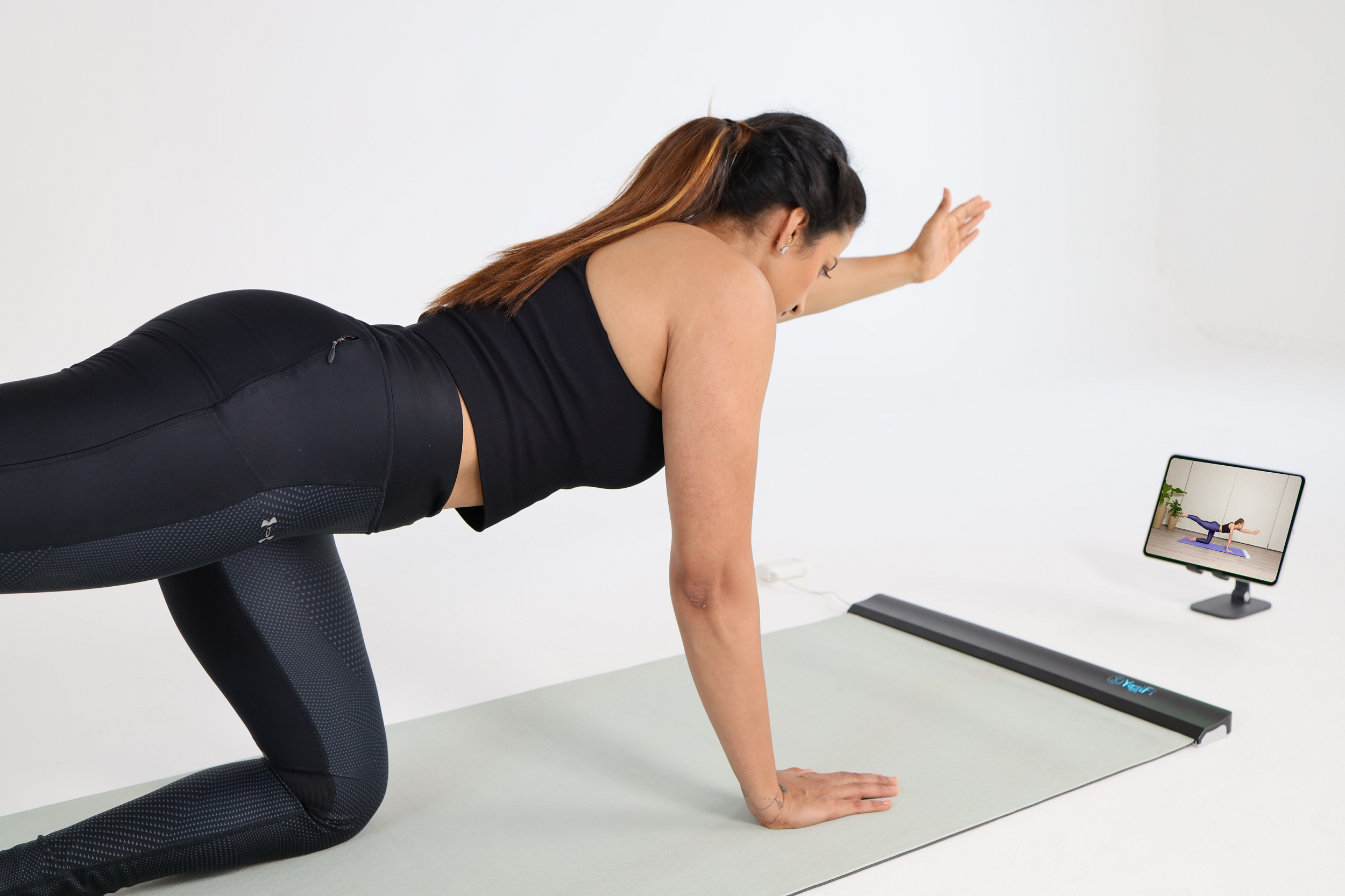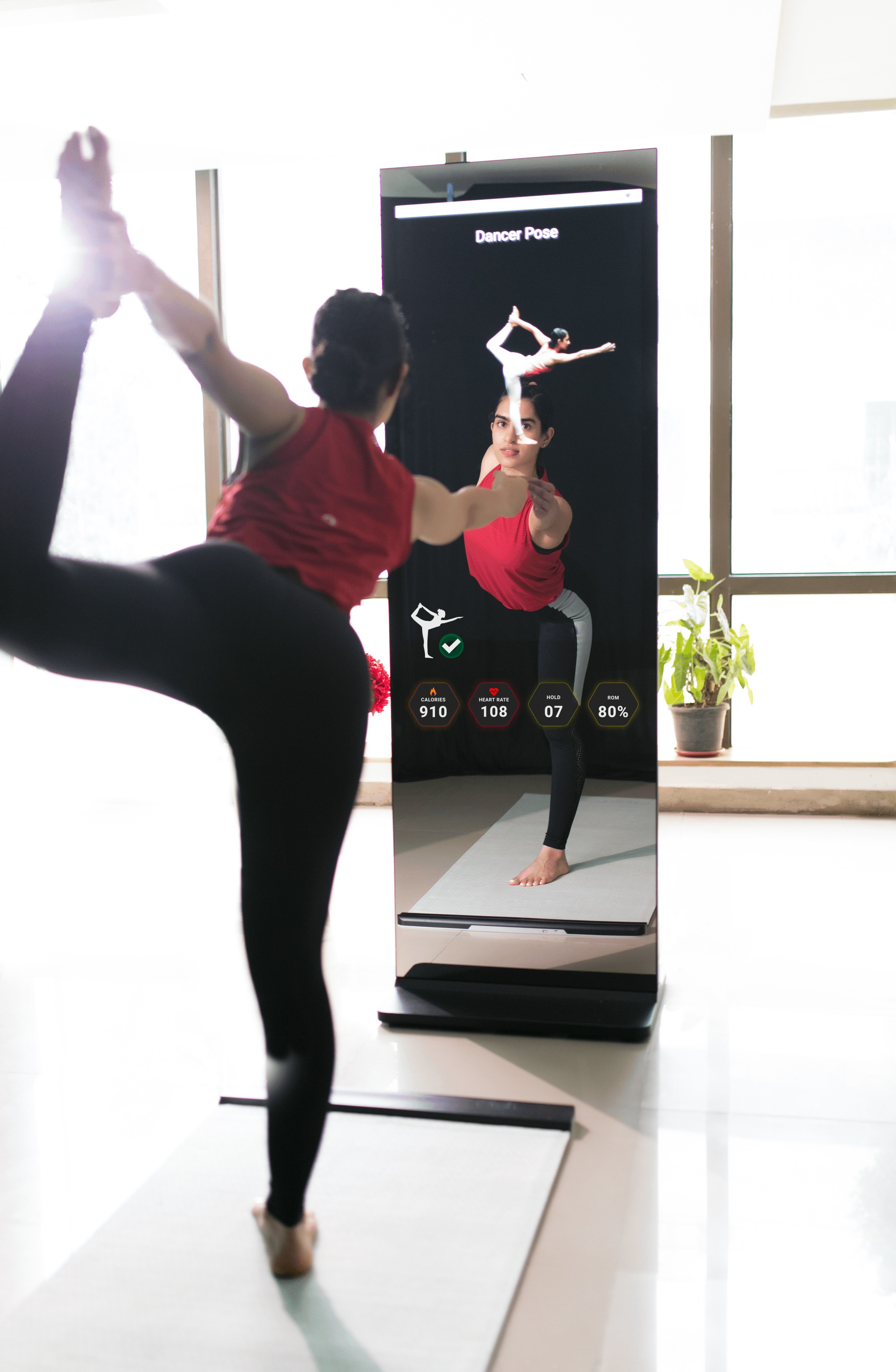Muralidhar Somisetty owes his life to yoga. The age-old Indian practice helped him recover from a spine injury without the need for surgery.
His love for yoga led him to become a certified yoga teacher. Although, he observed some real challenges with the adoption and effectiveness of online yoga sessions from practitioners.
In 2016, he founded Wellnesys Inc to bring more people onto the path of a healthy and happy lifestyle. “My love for yoga — flamed by the curious inclination to give something back to society — led me to conduct online yoga classes and personal therapy sessions,” Murlidhar, Co-founder and CEO, Wellnesys, tells YourStory.
The deep-tech wellness startup’s flagship product YogiFi delivers personalised and interactive yoga classes. The first of its kind AI-powered intelligent yoga mat unifies the best of ancient science and AI so users can practice anytime, anywhere with personalised feedback.

The YogiFi Mat
The product
Wellnesys’ YogiFi is a fusion of multiple technologies, including sensors, artificial intelligence (AI), IoT, edge computing, computer vision, and apps to create a nonpareil online and offline yoga studio experience at home.
The smart and eco-friendly yoga mats are sensor-equipped, designed to be paired with the mobile app — available on both Android and iOS — for enabling an interactive and immersive yoga class experience.
Enabled by Bluetooth and Wifi, the AI-powered yoga mat’s intelligent system acts as a personal trainer. It assists users in real-time with posture and breathing techniques when combined with its app and provides personalised wellness programmes based on users’ goals, limitations, and history.
Wellnesys focussed on multiple things. Firstly, it wanted to provide a personalised virtual trainer in the comfort of one's home to guide users to practice and provide real-time correctional feedback on their postures.
Secondly, it wanted to give users access to rich content and therapy programmes for various ailments, making it fun and easy to learn with an engaging gamification experience for beginners and youngsters.
Thirdly, the startup wanted to enable flexibility to practice anytime, anywhere despite one's busy schedule.
It also created a platform to track users’ daily progress and correlate their body vitals from the wearables to their overall practice to provide a 360-degree view of their holistic health and wellness.
According to Muralidhar, the YogiFi Smart Mat Generation-1 is already sold out, impacting thousands of users across 17 nations from Japan to the US.
Uniquely positioned in the yoga/wellness market, YogiFi sees interest from large corporates, sports and athletic brands, big-box retailers, and ecommerce players.
In fact, the startup wants to launch a feature to enable users to practice along with a personal trainer or participate in a fun challenge with any of their friends or peers on the YogiFi’s community leader board.
User feedback
Despite its personalised wellness programmes, Wellnesys faced challenges to introduce curated sessions based on insightful data and metrics, including strength, alignment, flexibility, and endurance.
It decided to build its product with customer feedback.
This is where its innovation, Yoga By Nature, came into play — yoga mats that connect with YogiFi App and act as personal trainers to extend advanced interactive sessions, track users’ activity and progress, and give real-time feedback on postures and flexibility.
Muralidhar explains, “The process allowed us to explore more by using AR/VR technology. YogiFi’s Virtual Studio feature on the app virtually transports users to exotic landscapes, including the Himalayas, forests, beaches.”
Building the team
Muralidhar first reached out to Pranav Kanuparthi, who had recently graduated with a degree in sensors and embedded systems. He was immediately onboard upon hearing the idea and helped build the prototype of the smart yoga mat.
Next, Sankar Dasiga — with his expertise in hardware for embedded systems — joined the startup. An embedded systems professor and Muralidhar’s ex-colleague at Cisco, Sankar is also an avid yoga practitioner since childhood.

In fact, one of Muralidhar’s childhood friends, Vinod, too, joined Wellnesys as Co-founder.
In the beginning, the startup analysed its competition across apps, general fitness, yoga, and corporate wellness in the US, including Daily Yoga, AsanaRebel, PivotYoga, etc.
The startup’s Make in India initiative promotes Atmanirbhar Bharat by sourcing raw materials locally and eliminating the dependency on imports, especially from China.
Thus, Wellnesys’ initiatives have created opportunities for the young skilled workforce and ITI diploma engineers.
Muralidhar shares, “Developing innovative systems and intelligent solutions for holistic wellness accessible for everyone did come with its peak moments. One such moment was selected for Qualcomm Design-in-India (QDIC) cohort 2020.”
He adds, “Qualcomm leadership team has been very supportive of our startup journey, making meaningful connections at the right time. The patent incentive has been really helpful as we could file more patents in the process.”
The Qualcomm initiative encourages design houses and product companies to invent innovative hardware product designs incorporating the company’s chipset platforms and technologies.
Futuristic innovations
At Consumer Electronics Show (CES) 2022, Wellnesys was back with a new product line-up — ARIA Smart Mirror — that aspires to elevate the experience of the wellness studios at home and bring about a positive lifestyle transformation.
ARIA combines AR/VR, computer vision, and smart sensing technologies to deliver interactive and immersive digital experiences via smart TVs and smart mirrors.
The lifestyle mirror has a 32 or 43-inch touch LED display, embedded with computer vision technologies for face and gesture recognition and posture tracking and training.
Beyond posture training for fitness and workouts, ARIA has a host of innovative apps, including diet recommendations based on goals and body vitals, virtual make-up and grooming for different occasions, dance lessons, etc.
Moreover, users can also use the mirror to shadow practice different sports, including cricket shots, to get instant feedback on the form and footwork, or engage in a fun activity with an interactive exergaming on the smart mat that comes along with the mirror, and more.
The difference and building the product
According to the World Health Organisation (WHO), today, physical inactivity and mental stress are the leading causes (an alarming 70 percent) of death.
Moreover, Mental Health America states that stress-related productivity loss in the US amounts to $450-$500 billion annually.
Meanwhile, the Yoga Alliance report highlights about 300 million yoga practitioners globally, expected to double every three years.
While well-known wellness and fitness companies exist, including the US-based Peloton, Mirror, and Tonal, Muralidhar says Wellnesys’ YogiFi is probably the only product from India — the land where yoga originated — with access to top trainers.
“YogiFi is a game-changer in the fitness industry as the mat can support other forms of fitness exercises. Thanks to the Jio wave, we are observing an encouraging trend around smartphone adoption and digital media consumption. However, our markets follow behind the US market trends when it comes to adopting hi-tech gadgets,” he explains.
Besides for personal use, athletes and sportspersons can access YogiFi and programmes focused on faster recovery and higher endurance.
Additionally, the startup has created an incentive model for teachers to deliver effective remote therapy sessions and expand their reach and impact beyond the four walls of yoga studios.
At present, Wellnesys aims to go after the western market — the US, UK, and Canada.
“We have had some challenges with access to vendors, following the recent backlash and heavy-duty imposed on certain raw materials imported from China. For this, we are considering looking at having a strong manufacturing base in India for YogiFi mats,” says Muralidhar.
He adds, “We are looking at impacting millions of users across the globe with a 10X growth plan in the next 10-12 months.”
Edited by Suman Singh




